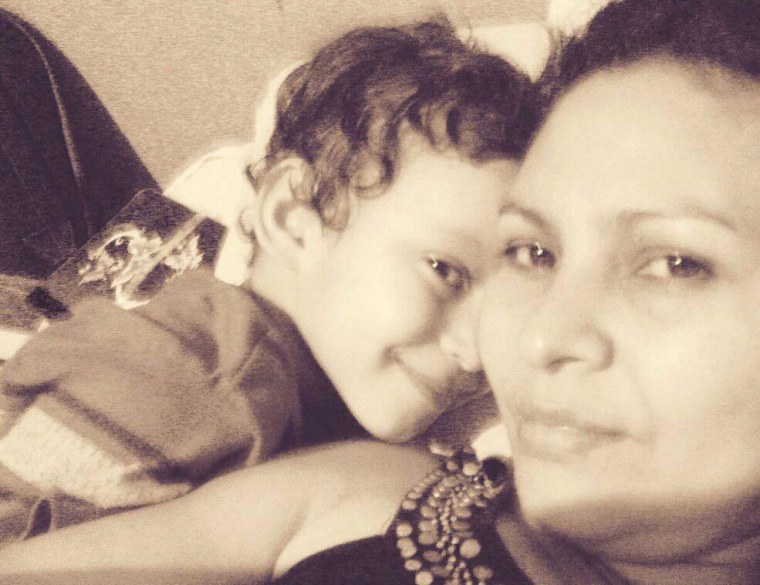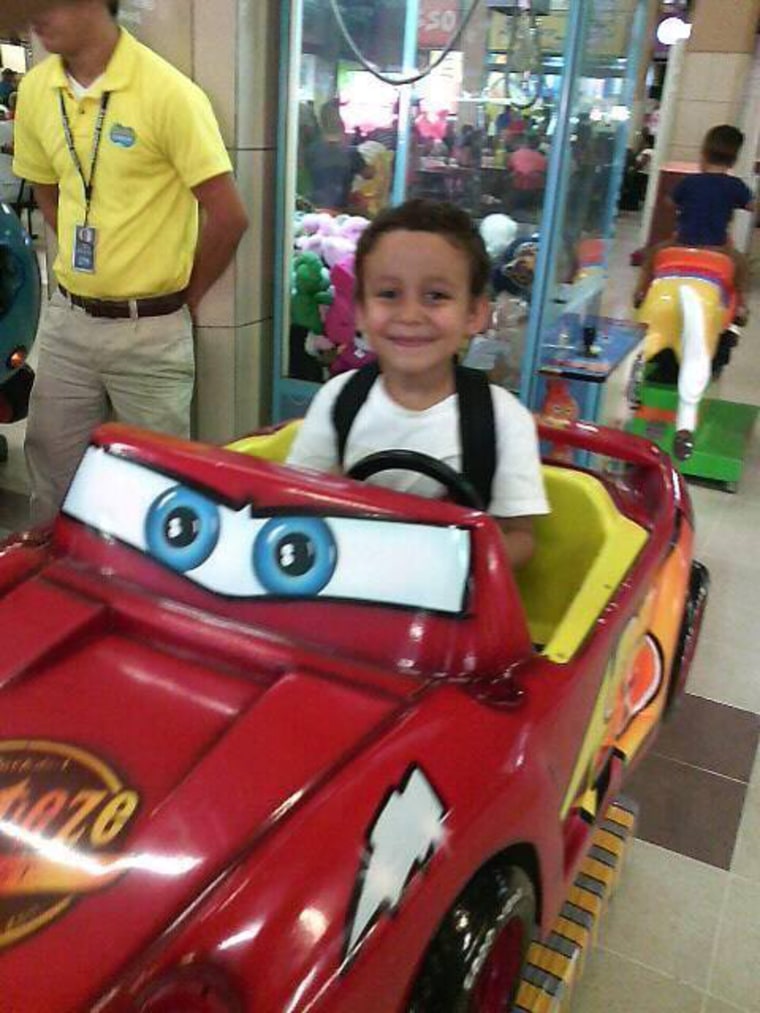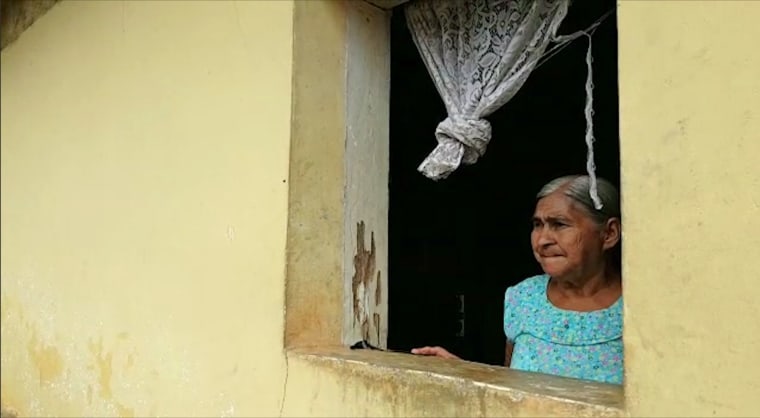MACUELIZO, Honduras — In her cinderblock home on a dirt road in the green hills of Honduras, 78-year-old Maria Mancia sat in a metal rocking chair and held a photo of her daughter and grandson up to the light.
"My soul hurts," she said. "I'm heartbroken. Because they're my blood."
"The mothers of the children are suffering," she added. "And another person suffers — the mother of the mothers who are there."
U.S. border agents separated Mancia's daughter Iris from her 6-year-old, Ederson, a day after the pair crossed the Rio Grande and entered the U.S. illegally. Since Iris and Ederson left their home amid the coffee fields of northwest Honduras 22 days ago, said Mancia, she has been desperate for any news about them. Like thousands of other Central American migrants, they seemed to have disappeared into a byzantine detention system.
"I would like to have them here, to embrace them, to talk to them," she said.
The Mancias' case is emblematic of how hard it is to reunite migrant parents and kids once U.S. officials have separated them — and how difficult it can be just to find out where they're being held. For families living in poverty in Central America, with limited access to lawyers, phones and internet, it can be almost impossible to access information about loved ones in U.S. detention.
Trump's "zero-tolerance" policy has led to the separation of more than 2,300 children from their parents. Most were fleeing violence and economic hardship in countries like Honduras, El Salvador, and Guatemala. Last week, Trump signed an executive order ending such separations. This week, the Department of Homeland Security announced that approximately 522 of those kids had been reunited with their parents. In a joint press release, the Departments of Homeland Security and Health and Human Services said that the government "knows the location of all children in its custody and is working to reunite them with their families."
But that work may not be swift. An unknown number of parents have already been deported without their children. Wherever they are living or being held, it can be difficult for parents and families to connect with a caseworker on the federal hotline set up to reunify families. Parents will have to work with consulates and family members back home to produce identification documents that can prove they are the parents of a child.
"When [separation] was implemented in the beginning, it was implemented without any plan," said Ruben Garcia, executive director of Annunciation House, a nonprofit organization in El Paso that assists asylum-seekers and refugees. "Now that the policy has been ended and we have all of these children and we've got to get the children back, we can see that they're really not ready and prepared to do that."
Mancia's grandson Ederson was taken from his mother, Iris, on June 15, the day he turned 6. She has spoken to him once on the phone since he was separated from Iris. He told his grandmother that he was in a place called Arizona, but he couldn't tell her any more than that.
"He was crying," she said. "He told me, 'My mother, I think she's in jail.' And I said, 'No. No, your mother is in another house, and later she's going to be with you.'"
Mancia cried as she recalled the sound of her grandson's distress, and how helpless she felt.
"I couldn't talk to him much," said Mancia. "Or comfort him."
Because Iris had little opportunity to make a life for herself and her son in Honduras, said Mancia, her daughter had to make a heart-wrenching decision. Leave her child behind, or risk an unknown fate with him in a new country. Mancia said that Iris told her, "I can't leave him here for you to take care of him."
"I think, to look for a life where you can have bread every day is not a sin," Mancia said. "It's a right for everyone."
On Friday, June 22, a caseworker called a family friend of the Mancias in the U.S. and told him Ederson was safe. NBC News traced the number of the caseworker's phone to an address in Phoenix associated with Southwest Key, one of the nation's largest contractors for sheltering unaccompanied minors.
HHS, the federal agency that oversees shelters for unaccompanied children, did not respond to NBC's requests for information about Ederson. A representative from Southwest Key declined to confirm or deny if the company was sheltering the boy at one of its facilities, and referred NBC to the hotline given to parents separated from their children.
Like many other migrant parents separated from their children, Mancia's daughter Iris has cycled through varying stages of detention — from holding facilities maintained by the U.S. Border Patrol, to a cell in the El Paso County Jail, where hundreds of detainees in the custody of federal marshals are held on any given day, most of them facing immigration-related offenses.

This week, after Trump's executive order, the Western District of Texas announced it was withdrawing criminal charges against most parents who had been charged with entering or reentering the country illegally. Iris was one of the parents whose case was dropped.
But Mancia has not yet been able to speak with her daughter.
"What [the president] is doing, locking up the children as if they were nothing more than animals," Mancia said. "And they're not. They're people. It's hard. Hard knowing that they are locked up, they aren't free there. And I can't see them, or talk to them."
On Saturday, Garcia, executive director of Annunciation House, watched as a large white bus emblazoned with the emblem of the Department of Homeland Security lurched to a stop in front of a phalanx of reporters and volunteers.
On the bus were 32 men and women who had been separated from their children, but had their criminal charges withdrawn or dropped. Now, having been processed by Immigration and Customs Enforcement, the parents will be allowed to remain in the U.S. while their immigration proceedings move forward. The process could take weeks, months or years.
More than half of the parents, like Iris, had been held in the El Paso County Jail.
El Paso County Commissioner Vince Perez, whose precinct includes Tornillo, the so-called tent city where more than 300 children are being held, has been sharply critical of the use of the jail to hold immigrant detainees. "Depriving refugees of their children as a matter of policy is vile and we should not condone or facilitate this practice," Perez said.
Taylor Levy, legal coordinator for Annunciation House, said staff would try as hard as they could to help the parents find their children.
"We know that's going to be the first question that all these parents are going to have," Levy said. "They're all really worried about their children."
But, she said, there is no "magic bullet."

"When you get arrested, for example, by Border Patrol, they give you a receipt for everything they took from you," Levy said. "It will say your rosary, your ID, your $2.50, and you sign it. And there's copies and there are receipts. And the parents are given nothing like that, for their children, when their children are taken from them."
The men and women, their faces weary, stepped off the bus and walked single-file to receive a hug and a blessing from volunteers. Then, they entered the shelter of Annunciation House. "Welcome," one volunteer said.
Among them, in a bright fuchsia shirt, was Iris. No longer shackled, but still in limbo, and still without her son. When an NBC News reporter called her name, she turned her head, smiled, and said, "Hola."
"How is a mother going to feel," Mancia said, "knowing that her boy is separated from the only person that knows how he sleeps, knows how he eats and knows how to take care of him?"
Lilian Caballero reported from Macuelizo, Honduras. Lisa Riordan Seville and Hannah Rappleye reported from El Paso, Texas.
